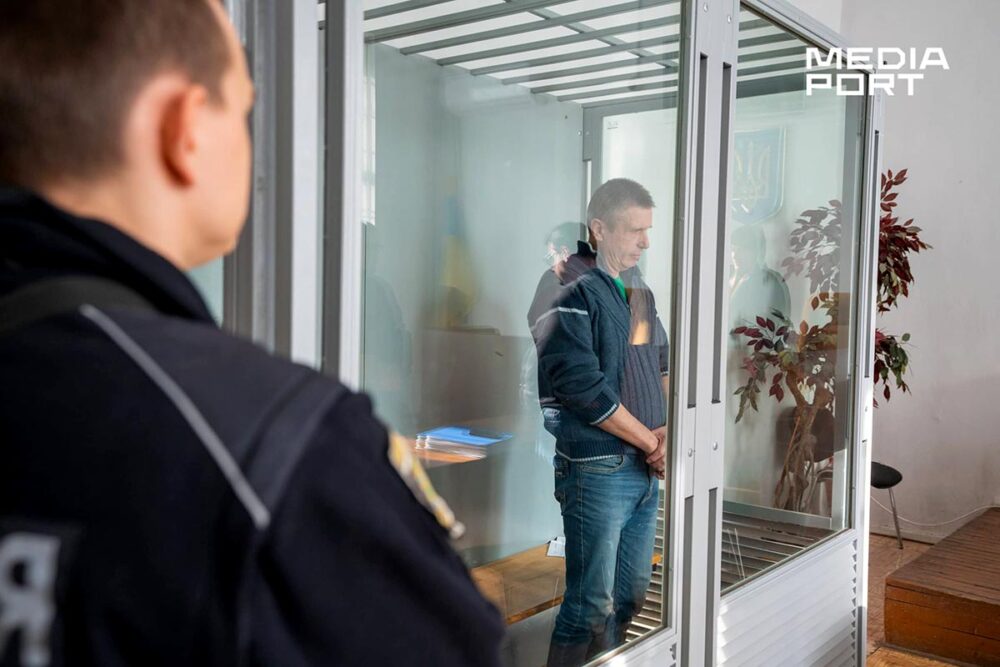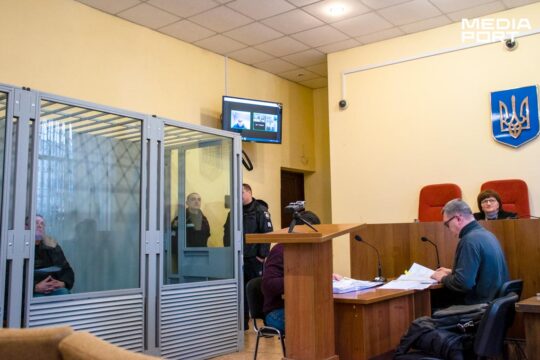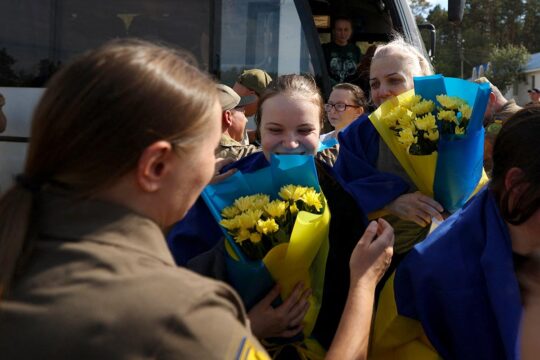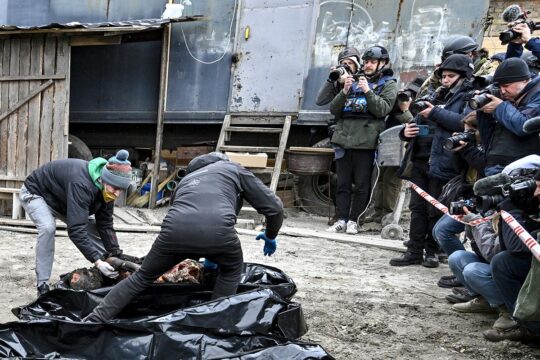The October sun floods the courtroom with its cracked linoleum dotted with black specks. This is the second autumn that Anatoliy Derevyanko, 57, an engineer from the village of Verbivka, Balakliya district, spends back and forth between the prison and the court.
- “I feel fine, my plea hasn’t changed [not guilty]. I am waiting for the verdict. I hope it will be fair,” the accused said through a slot in the glass-walled dock.
- “What does ’fair’ mean to you?”, the journalist from MediaPort asks.
- “I wish there was an acquittal. However, in these circumstances, I think it is unrealistic. Due to the prosecutor’s office pressure, it never happens.”
The prosecutor refuses to comment on anything or react to the remarks of the accused before the verdict is announced. He asks to wait until his closing arguments. Derevyanko does not expect leniency from him. He is sure the prosecutor will ask the court for 5 years in prison - the maximum sentence. “If it’s even a bit less, I think it would be a good thing. There have been suspended sentences, 10 years as well, 5 to 8 years, and sometimes 3. There have been all kinds of sentences,” the accused says, explaining that he got acquainted with the court practice during the year and a half of the trial.
Jailed since March 2023
Derevyanko has been in custody since March 2023. Initially a witness in the case, he did not think he would become a suspect. But the prosecution accused him of having profited from the occupation to become self-proclaimed manager of the Grain Storage Company of Balakliya, during the Russian occupation of this city located in the Kharkiv region, eastern Ukraine.
Derevyanko had been working for the Balakliya Grain Storage Company since the 2000s. He did not leave during the Russian occupation, which lasted from March to September 2022. After the manager quit, the chief engineer continued to go to work. Other employees did the same. There was still grain in this storage facility they call “the elevator”. The Company was one of the most prosperous firms in the area. In addition to the elevator, its agricultural holding under the umbrella of “Megabank” (declared insolvent in June 2022 and currently in liquidation) included a bread-making plant and a mill.
His defence lawyer, Serhiy Chub, says the chief engineer was only taking care of his team and protecting economic property. Chub, brought his client's case before the European Court of Human Rights to challenge the preventive measure. Following the lawyer’s claim, the court initiated proceedings. “We filed a claim because of my client’s rights’ violation: his preventive measure of detention was continuously extended. We believe that it is not legal, as the criminal offence is of a mild degree, and there is an alternative in the form of bail or any other preventive measure. This is too severe and disproportionate to the charges against him,” Chub explained.
Before the closing arguments on 24 October 2024, the defence asked the court to admit two documents to the case files: a letter of gratitude for charitable support to the Ukrainian army which, according to the lawyer, confirms his client’s patriotism, and a character reference from the pre-trial detention centre. “He tries to maintain friendly relations with his cellmates, behaves politely when communicating with representatives of the administration and staff of the detention centre, shows reasonable initiative and interest, cooperates willingly, and complies with the legitimate demands of the staff”, judge Svitlana Yashchenko reads out the document from the Kharkiv detention centre.
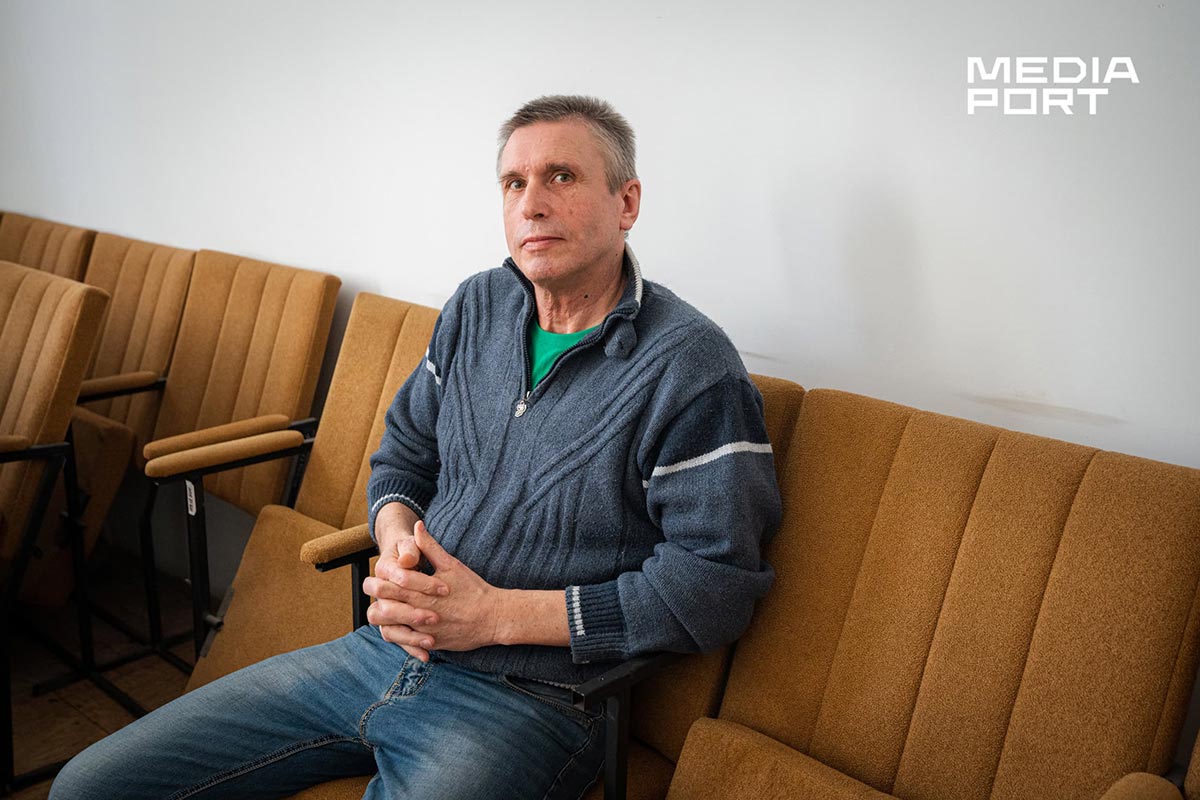
Accused of collaboration with the aggressor
The prosecutor spends the next half hour voicing his position: he considers Derevyanko’s guilt thoroughly proven. “Pursuing the goal of gaining profit and engaging in commercial activities in collaboration with the occupation administration of the aggressor state, in early August 2022, while under the occupation of the Balakliya territorial community of the Izyum district, Kharkiv oblast, he willingly accepted to assume the position of acting director of the Grain Storage, offered to him by Mr Shevchenko, the head of the temporary civil administration of Balakliya, Izyum district,” he says.
According to the prosecution, while under the Russian occupation and in the absence of the manager, Derevyanko arbitrarily ran the company and conducted business in collaboration with the aggressor. “Given his testimony, we conclude that Derevyanko confirmed having resumed work and having performed organisational and administrative functions at the said company,” the prosecutor says.
However, the prosecutor notes that the accused did not admit to collaborating with the occupation authorities and signing company documents. “It was all done in order to preserve the company’s property, as Anatoliy Ivanovych believes, out of the need to gain some money to survive and in the absence of an order to suspend work or to abandon the company... Nevertheless, this claim is the defendant’s right to self-defence, an attempt to avoid criminal responsibility, showing a lack of awareness and remorse for the crime and is refuted by the evidence in the criminal proceedings,” the prosecutor states.
As evidence of the defendant’s guilt, the prosecutor invokes the seized documents, as well as witness statements, and asks for a five-year prison sentence.
“Ukrainians helped Ukrainians to preserve the grain”
But even most of the prosecution witnesses supported Derevyanko, as the defence lawyer argued. MediaPort has previously published some depositions - in particular, Oleksandr Globa's, a farmer, who said that he delivered his grain to the elevator because there was no other place to store it.
Derevyanko did meet with the occupiers, but he insisted that he did not sign any agreements with them nor receive any money. If the occupiers did plan to take control of the company, they did not have enough time to establish their own regulations, said Larysa Nazarenko, one of the company’s employees and a witness in the case. She considered all discussions of Balakliya becoming a part of the Belgorod region as “lunacy”: “they didn’t really understand what to do with it, how it would be and what would happen, and suggested we go back to work and start by renovating our offices. I was among those who went back to the elevator in order to earn as much as a jar of pâté to survive... We would preserve what was left in the elevator. We would weld shut certain storages to prevent them from being looted. And he [Derevyanko] was like the head of our gang.”
The company’s contracts for farmers were translated into Russian, but the basis for it was a previously used template in Ukrainian. “These are contracts with the Ukrainians. The prosecution did not introduce any representatives, Russian citizens, [to prove] this collaboration... The Ukrainians helped the Ukrainians to preserve the grain, which, by the way, was returned intact in the same volume as it was received. Both the manager and the chief accountant confirmed that an inventory was carried out after the de-occupation, and there was no financial damage,” Derevyanko’s defence lawyer, Chub said.
In his final statement, Derevyanko repeated what he had said many times before. He insisted that he “fulfilled his professional duties”, went to work to help his fellow villagers, and had no intention of collaborating with the occupiers. “I went back to work for one month to help our Ukrainian farmers preserve the grain they had grown. As a result of my work, after the de-occupation, the company received payment for the work I performed. Following this payment, Ukraine received a profit in the form of taxes. It means that now you are prosecuting me for the fact that the state made a profit,” the defendant said.
Found guilty but freed with a probation sentence
On 30 October 2024, judge Yashchenko returns from the deliberation room to announce the verdict: “Anatoliy Ivanovych Derevyanko is hereby found guilty of committing a criminal offence and sentenced to 4 years imprisonment with prohibition to hold positions related to administrative and executive functions for a period of 10 years, without confiscation of property. [He] is suspended from serving the sentence of imprisonment with a probationary period of 3 years,” the judge read the ruling.
Behind the glass wall, Derevyanko could not clearly hear the decision. He only realised he was free when the court guard opened the door of the dock, and his defence lawyer explained what had happened. “You were found guilty, but your sentence is suspended for three years. The preventive measure is cancelled. It’s over,” Chub explained. “If you don’t commit another offence during these three years, you won’t be serving a prison sentence.”
Derevyanko came to the announcement of the verdict empty-handed: he did not take his belongings or passport. His mood is cautiously optimistic. “I wasn’t ready. I had hope. But anything could have happened... What emotions? I can be free now! And that’s good. Let’s see how it goes. I will try to get home,” Derevyanko says.
- “Do you know about the situation in the country?”, the journalist from MediaPort asks.
- “Of course, we have a TV.”
- “And do you hear the explosions?”
- “We hear them, we hear it all.”
As soon as Derevyanko was released from custody, his defence lawyer shook his hand, and immediately afterwards, the prosecutor, who once again abstained from commenting, left the courtroom. They are likely to meet again soon - this time in the appeal court. Both the defence and the prosecutor’s office have thirty days to decide whether to appeal the decision.
This report is part of our coverage of war crimes justice produced in partnership with Ukrainian journalists. A first version of this article was published on the "MediaPort" website.



